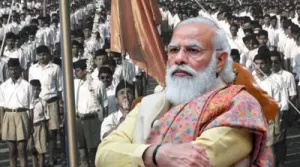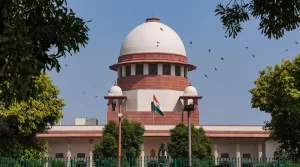In an insightful Lok Sabha speech on February 2, Congress leader Rahul Gandhi said, “India is described in the Constitution as a union of states and not as a nation. One cannot rule over the people of a state in India. Different languages and cultures cannot be suppressed. It is a partnership, not a kingdom.”
He sharply castigated the BJP and its top leadership for functioning like the “king of India” that was “smashed in 1947” by the Congress and held Prime Minister Narendra Modi responsible for bringing back the “idea of a king”.
BJP leaders were rattled by that speech and targeted Rahul Gandhi without countering the substantive issues raised by him. His statement invited a sharp reaction from BJP IT cell chief Amit Malviya, who tweeted: “Rahul Gandhi’s claim that India is not a nation but a “union of states” is deeply problematic and dangerous. It not just betrays his lack of understanding of our Constitution but also strikes at the core of idea of independent India. It seeds the idea of India’s balkanisation.”
The tweet shows a poor understanding of India’s history of freedom struggle and the process of making the constitution, during which the leading architects of modern India reflected on the idea of the Indian nation as a dynamic and evolving concept. Rahul Gandhi’s utterance that India is not a nation but a Union of States is evocative of both Mahatma Gandhi and B.R. Ambedkar’s vision of India. Those two stalwarts of our history underlined the necessity to strive to make India a nation.
Gandhi and Indian nation
In 1941, Gandhi authored the text “Constructive Programme” containing several points such as communal unity, economic equality, equality of women, removal of untouchability and improving the livelihood of farmers. He stated that if the Constructive Programme is implemented and the activities prescribed therein are carried out, India could achieve independence non-violently. While expounding the issues concerning Adivasis sensitively, he observed, “Our country is so vast and the races so varied that the best of us cannot know all there is to know of men and their condition.” He added, “As one discovers this for oneself, one realizes how difficult it is to make good our claim to be one nation, unless every unit has a living consciousness of being one with every other.”
Would those who commented harshly on Rahul Gandhi’s observation on the Indian nation have assailed Gandhi for taking a stand that it would be difficult to prove the claim that India is a nation? At a time when the vilification campaign against Gandhi has been relentlessly taken forward by several Hindutva and BJP leaders and the ruling leadership of India remains deafeningly silent, they would have found Gandhi’s account of the Indian nation reprehensible. No wonder that those with an incomplete understanding of the history of the Indian freedom struggle found Rahul Gandhi’s statement “deeply problematic”.
Ambedkar and Indian nation
The BJP leaders who made scurrilous remarks against Rahul Gandhi would also do well to know Ambedkar’s views. Like Gandhi, he was very cautious in explaining that India could not be described as a nation and the sooner people realised it, they would strive to make it a nation by taking concerted measures.
In fact, Ambedkar while delivering his last speech in the Constituent Assembly, recollected the history of the US and informed that there were serious differences of opinion among Americans of that time to describe it as a nation. He added that during the formative stage of the US, when the phrase, “O’ Lord, bless our nation” was adopted, the next day, many protested and it was altered to say “O’ Lord, bless these United States.” Ambedkar explained that “objections were raised by the laity to the word ‘nation’ as importing too definite a recognition of national unity”.
Then he asked with poignancy, “If the people of the United States could not feel that they were a nation, how difficult it is for Indians to think that they are a nation.”
He continued by saying, “I remember the days when politically minded Indians resented the expression ‘the people of India’. They preferred the expression ‘the Indian nation’.”
However, he cautioned and stated, “The sooner we realise that we are not as yet a nation in the social and psychological sense of the world, the better for us.”
“For then only,” he said, “we shall realize the necessity of becoming a nation and seriously think of ways and means of realising the goal”.
Such reflections of Ambedkar closely correspond to Gandhi’s statement.
Castes are anti-national
Exercising caution, Ambedkar had observed that the realisation of the goal to make India a nation “…is going to be very difficult – far more difficult than it has been in the United States. The United States has no caste problem. In India there are castes. The castes are anti-national.”
Explaining further the difficulties posed by castes to make India a nation he said, “In the first place because they bring about separation in social life. They are anti-national also because they generate jealousy and antipathy between caste and caste.” Asserting that “we must overcome all these difficulties if we wish to become a nation in reality,” he proclaimed “fraternity can be a fact only when there is a nation. Without fraternity equality and liberty will be no deeper than coats of paint”.
Elsewhere, he wrote, “Nationality is a social feeling. It is a feeling of a corporate sentiment of oneness which makes those who are charged with it feel that they are kith and kin. This national feeling is double edged feeling. It is at once a feeling of fellowship of ones own kith and kin and an anti-fellowship feeling for those who are not one’s own kith and kin. It is a feeling of consciousness of kind; which on the one hand binds together those who have it so strongly that it overrides all difference arising out of economic conflicts or social gradations and, on the other, severs them from those who are not of their kind. It is a longing not to belong to any other group. This is the essence of what is called a nationality and national feeling.”
Ambedkar’s thoughts on India and nationhood would have made him a target of attacks by BJP leaders who are not sparing Rahul Gandhi for explaining the idea of the Indian nation almost in the same manner as Ambedkar did in the Constituent Assembly. It is, therefore, important to understand the thoughts of Gandhi and Ambedkar to sharpen the idea of the Indian nation, which is being continuously shaped within the framework of a ‘Union of States’ as enshrined in the constitution.
(S.N. Sahu served as Officer on Special Duty and Press Secretary to President of India K.R. Narayanan. Courtesy: The Wire.)




